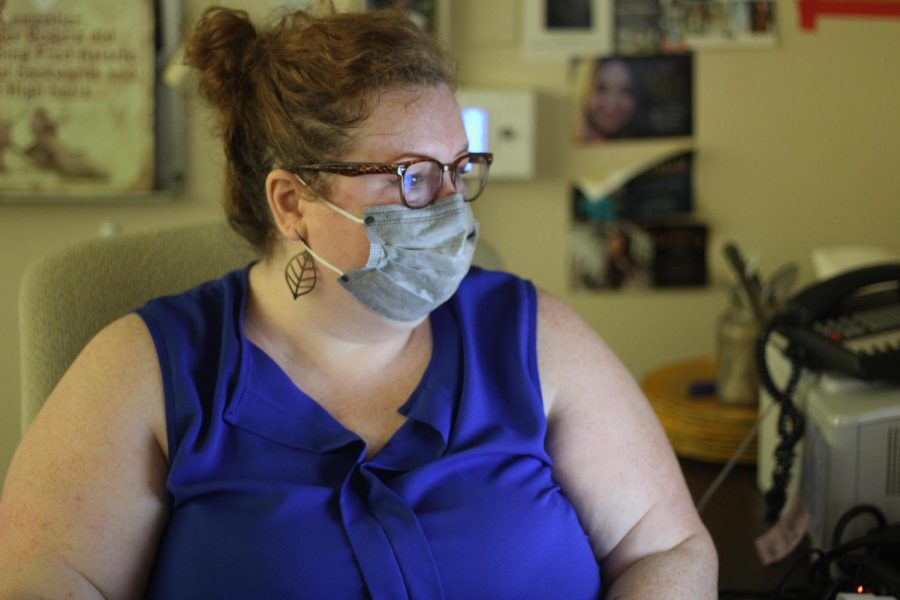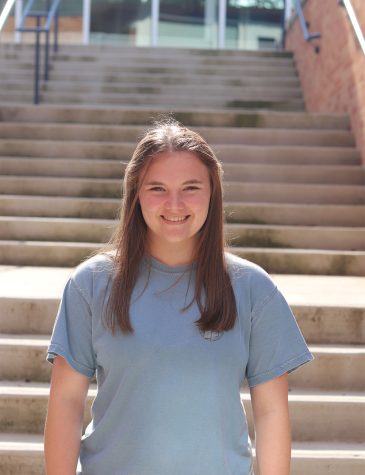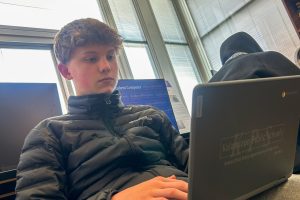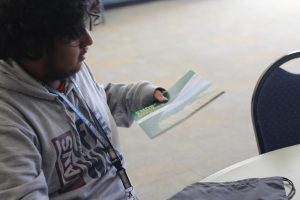Women’s Studies and African American Studies; history through the eyes of the silenced and overlooked
Credit: Hannah Locke
Rebecca Layton wrote the Women’s Studies curriculum and teaches the class during first hour. Layton also teaches and wrote the curriculums for the Loy Norrix psychology and sociology courses.
October 8, 2021
Every year, the prospect of new classes, new curriculums, and new teachers is exciting. Whether it be a required class like economics, an art class like ceramics, or an English class like creative writing, there are subjects for everyone at Loy Norrix.
A couple classes that may have passed you by are Women’s Studies and African American Studies. Both classes cover topics and groups of people that are often skimmed over during your normal history course.
In November of 2018, the idea of a Women’s Studies class was proposed to the Kalamazoo Public Schools board by Loy Norrix alumni Emma Hilgart-Griff and Isaac Moss. Over a year later, on December 5, 2019, the class was approved. Psychology and Sociology teacher, Rebecca Layton collaborated with Hilgart-Griff and Moss to write the curriculum and the class was first offered for the 2020-2021 school year.
“I thought it was something that would be well-received here. I just thought it would be a good place for it, I thought the kids would really like it, and I was really excited for the opportunity to do it,” Layton said.
Layton is now teaching the class and thoroughly enjoys it.
“It has so many great discussions and we had great projects. It’s everything from let’s talk about ancient history to let’s create a Spotify playlist with our favorite feminist songs to let’s talk about court cases,” Layton gushed, “It’s both deeply personal and political and historical, so it’s just been a really interesting class to get perspectives on, it’s been an interesting class to hear what students have to say.”
The class is a diverse one and isn’t just for women.
“People are coming in with their own curiosities, their own experiences and, yeah, I have nonbinary people in there: I have men, it’ not like it’s a womens’ only class,” Layton said.
When speaking on the struggles of gender inequality, the LGBTQ+ Pride movement, struggles for racial justice, or socioeconomic inequality are relevant as well.
“Yeah, it’s mainly focused on women, that’s the message,” Layton conceded, “But you can apply that to anything. You can apply that to sexual-orientation, you can apply that to race, you can apply that to economics, you can apply that to worker’s rights. It’s applicable across the board.”
Junior Hope Wilson is taking the class right now and has become very invested in the subject.
“This class is a great opportunity to learn amazing things, about amazing women throughout history that you probably wouldn’t be able to just taking normal history classes,” Wilson raved.
If you have already taken Women’s Studies or the subject doesn’t interest you, another class to consider is African American Studies. Like Women’s Studies, this class amplifies the voices and stories of people who are often silenced and presents events that go often are overlooked.
Richard Rashad, a second year teacher, is not new to this class. Rashad taught the course earlier in his career, though it is his first year teaching it at Norrix.
The goal of this class, Rashad said, is to showcase the beauty of African culture and not let it be overshadowed by traumatic events like slavery.
“We felt slavery has become overrepresentative of the country,” Rashad said, “History often doesn’t show Africa in a favorable light.”
Shedding inner bias is an important component of this course and students are encouraged to look at African American history through a “historically correct lens,” Rashad said.
The class is fact-based and Rashad has started this trimester off with a unit on African geography. He wanted to showcase the geographical beauty of the country before getting into its history. Understanding the gravity of Africa’s influence on the world is one of Rashad’s main goals.
“They [students] are often shocked to find out that everyone has roots in Africa,” Rashad explained, “It is the cradle of life and human existence.”
“He [Rashad] teaches us the truth about misconceptions about black history, important information most students have never even heard about before, and other really interesting things,” said sophomore Trinity Rolan, who is taking the class with Rashad this trimester.
Looking at history through the eyes of people who are so often overlooked can add depth to both your education and your view of the world around you. When the time comes to pick classes for next year, make sure to keep Women’s Studies and African American Studies in mind.













Emma Hilgart-Griff • Oct 9, 2021 at 3:22 pm Knight Life Pick
It’s truly wonderful to hear about the impact this class has on the students and staff at Loy Norrix, as one of the individuals who collaborated on it I couldn’t have hoped for a better result!